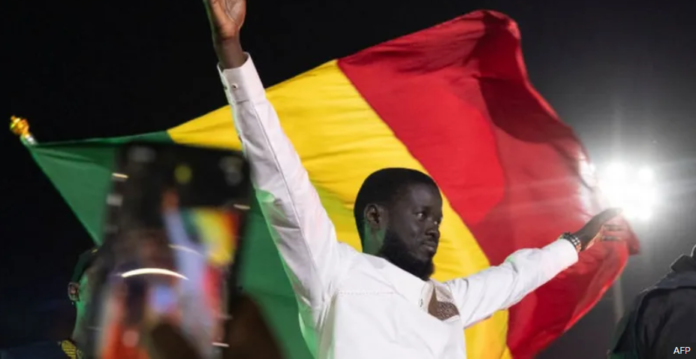
Few had heard of him a year ago, and now he is set to become president.
Bassirou Diomaye Faye’s extraordinary rise caps a rollercoaster period in Senegalese politics that caught many off-guard.
Months in jail alongside ally and kingmaker Ousmane Sonko ended suddenly, with the pair released the week before the presidential election.
Now Mr Clean, as he’s nicknamed, must get to work on the sweeping reforms he has promised.
“Methodical” and “modest” are words often used to describe the tax collector, who celebrates his 44th birthday on Monday.
Mr Faye fondly recalls his rural upbringing in Ndiaganiao, where he says he returns every Sunday to work the land.
His love and respect for village life is matched by his deep distrust of Senegal’s elites and establishment politics.
“He’s never been a minister and wasn’t a statesman so critics question his lack of experience,” analyst Alioune Tine tells the BBC.
“But, from Faye’s point of view, the insiders who’ve run the country since 1960 have made some catastrophic failures.”
Fighting poverty, injustice and corruption are top of Mr Faye’s agenda. While working at the Treasury, he and Mr Sonko created a union taskforce to tackle graft.
Gas, oil, fishing and defence deals must all be renegotiated to better serve the Senegalese people, says Mr Faye.
He is ushering in an era of “sovereignty” and “rupture” as opposed to more of the same, he told voters, and that is especially true of ties to France.
Senegal’s president-elect says he will drop the much-criticised CFA franc currency, which is pegged to the euro and backed by former colonial power France.
Mr Faye wants to replace it with a new Senegalese, or regional West African, currency, although this will not be easy.
“He will have to deal with the reality of the budget to begin with… But I see that he has a lot of ambition,” former Prime Minister Aminata Touré, who served under outgoing President Macky Sall, tells the BBC.
Strengthening judicial independence and creating jobs for Senegal’s large young population are also key priorities for Mr Faye – neither of which “President Sall paid much attention to and it caught up with him”, Ms Touré adds.
She is not the only political heavyweight to have thrown her support behind the 44-year-old – former President Abdoulaye Wade did the same just two days before Sunday’s vote.
It is a remarkable turnaround for Mr Faye who spent the last 11 months in prison on charges of insurrection, and many more years before that in his ally’s shadow.
‘Bassirou is me’
Bassirou Diomaye Faye was announced in February as the so-called “Plan B” candidate, replacing the charismatic opposition firebrand Ousmane Sonko. “I would even say that he has more integrity than me,” Mr Sonko said proudly.
Both men founded the now-disbanded Pastef party, both men are tax collectors, and both men found themselves jailed last year on charges they said were politically motivated.
Mr Sonko ended up being convicted of two offences, which meant he was barred from the election, so Mr Faye stepped in.
“Bassirou is me,” Mr Sonko told supporters recently. “They are two sides of the same coin,” Pastef colleague Moustapha Sarré agrees.
This has led to criticism that Mr Faye is merely “president by default”.
Not so, says analyst Mr Tine. But the pair’s relationship could usher in a new style of leadership.
“Maybe they will establish a tandem and break away from the hyper-presidential model of having an all-powerful head of state.
“Sonko is of course the uncontested leader of Pastef – an icon, even… [But] the two have had a [dynamic of] complicity and collusion.”
Once upon a time, Mr Faye wanted nothing to do with politics. “It never crossed my mind,” he said in 2019 while recalling his childhood.
One of Mr Faye’s heroes is the late Senegalese historian Cheikh Anta Diop – whose work is seen as a precursor to Afrocentrism. Both are seen as left-wing cheerleaders for pan-Africanism.
As early results came in on Monday showing Mr Faye was set for victory, people in the capital, Dakar, celebrated by honking car horns and singing to loud music.
The reaction from international markets was less jubilant, with Senegal’s dollar bonds falling to their lowest level in five months. Reuters news agency reports that investors are concerned Mr Faye’s presidency may wind down the country’s business-friendly policies.
”By electing me, the Senegalese people have chosen to break with the past,” he told journalists later on Monday. “I promise to govern with humility and transparency.”
The election was originally due last month but Mr Sall postponed it just hours before campaigning was set to begin, triggering deadly opposition protests and a democratic crisis.
Most candidates had very little time to prepare once the new election date was set – but Mr Faye had just over a week after being freed from jail.
Despite the shortened campaign period, Senegal’s citizens were adamant they would turn out and use their vote, Christopher Fomunyoh – of the National Democratic Institute for international affairs – told BBC Newsday.
“Senegal is in the process of confirming that democracies can self-correct and come out stronger and more resilient.”
BBC
